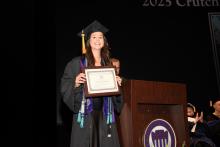Established in the fall of 2024, the Crutchfield-Tolnay Award for Excellence in Undergraduate Research is given annually to an undergraduate who has made strong contributions to either independent or collaborative research in the Department of Sociology. In addition to being recognized at our annual department graduation event, the recipient receives a $1000 award.
Students are nominated by Sociology professors, instructors, and TAs and selected by the department’s Awards & Community Life Committee, which then makes its recommendations to the Chair. Only graduating seniors are eligible.
Robert Crutchfield chaired the Department of Sociology from 1998 to 2003 and again from 2008 to 2011, while Stewart Tolnay chaired the department from 2003 to 2008. Both were excellent mentors for scores of students and provided excellent mentorship of undergraduate students engaging in their first experiences with research.
Prior to becoming a part of the Sociology Honors Program, Caroline Hale worked as a research assistant in the Department of Sociology for about a year and learned to love the research process because it requires her to constantly evolve her own perspectives and challenge her assumptions about the social world. The Sociology Honors Program got her excited about shifting from supporting research to directing it by designing her own project. The focus of her thesis was the field of transgender studies because as a cisgendered person, she witnessed blatant transphobia and wanted to be a part of the group of people pushing for social change. Her motivation for studying sociology is to challenge unquestioned perspectives by highlighting ignored, marginalized, or hidden ones. Her honors thesis project was an opportunity to practice and contribute to that goal.
The thoughtful timeline of the honors program kept Caroline on track to do roughly 6 annotations a week and accrue relevant readings quickly. Additionally, she was in conversation with multiple professors and graduate students who had great recommendations for relevant literature. The literature review process was difficult, because it required constant writing and rewriting considering new perspectives to ultimately reach a point that thoughtfully summarized and reflected on the relevant theories and background underpinning her project. Although challenging, this allowed Caroline to put her ideas in conversation with existing research and identify the most important areas where she could contribute. Through this process she solidified her final research questions: how do understandings about the transgender identity shape attitudes and behaviors towards trans and non-binary individuals? And how do these attitudes and behaviors impact identity formation?
Working alongside a cohort of peers, on similar but different journeys, not only elevated Caroline’s perspective, but also added thoughtful nuances to her project allowing her to critically reflect on their projects and pushing her imagination beyond the boundaries of her own work.
From the literature review, Caroline began thinking through what the best way to investigate these questions in practice would be. She considered a few different methodological approaches, surveys, interviews, and even contemplated conducting an experiment. Eventually deciding interviews would be the best way for her to get thick descriptive data, leave room for unexpected findings, and center trans and non-binary voices in her research. However, as a relatively shy person, she did not anticipate loving the interview process as much as she did.
“Hosting interviews was absolutely my favorite part of the research process,” says Caroline. “It’s such a unique human experience to have the opportunity to sit down with someone one-on-one and ask them in-depth questions about their lived experience…These interviews inspired a new source of motivation for my project because I was reminded of the bigger picture: why I am doing research in the first place and what I want to contribute to the world through doing it—inclusively regardless of, and with appreciation for, diverse gender identities and expressions. This motivation fueled my data analysis.”
Caroline is excited for the next phase of her life because she says “I know what fulfills me intellectually and emotionally: research.” Her thesis work exemplifies the Crutchfield-Tolnay awards goal of making strong contributions to either independent or collaborative research in the Department of Sociology.
Looking forward, Caroline will pursue publishing her honors thesis, “The Role of Social Essentialism on Motivating Transgender Double Consciousness” and is preparing to present her findings at the American Sociological Association and The Society for the Study of Social Problems annual conferences in August. She also plans to begin applying to PhD Sociology programs. We look forward to seeing her continue on her path as a sociologist!
